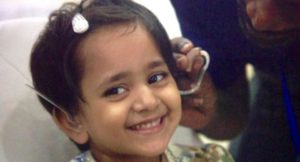
Overview of Speech Disorders
Hearing ability is important for children to develop speech and language skills as they grow. In the past, hearing loss in children often went undetected until the child was around two years old.
Can we detect hearing loss early?
Newborn Hearing Screening is the answer.
Detection and intervention for hearing loss prior to six months of age results in significantly better language outcomes than intervention after six months of age. As a result, newborn hearing screening has become universal in western countries & hearing losses are being identified and treated at much younger ages.
How common is hearing loss in children?
1 per 1,000 newborns have a hearing loss.
Causes of childhood hearing loss
Hearing losses in children can be conductive, sensorineural or mixed. Early hearing loss especially that which is undiagnosed can cause significant development and emotional problems for children that have long-lasting effects.
Congenital hearing loss
Congenital hearing loss means it was present in an infant at birth.
Environmental factors
- Birth complications, rubella cytomegalovirus, toxoplasmosis or another serious infection, lack of oxygen or the requirement of a blood transfusion for some reason.
- Premature birth – Babies that have a birth weight of less than 3 pounds or that require certain life-sustaining drugs for respiration due to prematurity are at risk for hearing loss.
- A nervous system or brain disorder.
- The use of ototoxic medication – by the mother during pregnancy or in neonatal period. Some medications cause damage to the auditory nerve or other hearing structures of the fetus.
- The mother had an infection during pregnancy, including things like toxoplasmosis, cytomegalovirus, herpes simplex or German measles.
- Drug or alcohol abuse by the mother or smoking during pregnancy.
Genetic factors cause more than 50 percent of all hearing loss in children, whether present at birth or developed later in life.
-
Acquired hearing loss
- A perforated eardrum
- Otosclerosis or Meniere’s diseases, which are progressive
- Infections like meningitis, measles, mumps or whooping cough
- Taking ototoxic medications
- A serious head injury
- Exposure to loud noise, causing noise-induced hearing loss
- Untreated or frequent otitis media (ear infections)
- Exposure to secondhand smoke
Parents checklist for hearing
-
0-4 months-
- Startle at loud sounds
- Wake up or stir at loud noises
- Respond to your voice by smiling or cooing
- Calm down at a familiar voice
-
4-9 months-
- Smile when spoken to
- Notice toys that make sounds
- Turn its head toward familiar sounds
- Make babbling noises
- Understand hand motions like the bye-bye wave
-
9-15 months –
- Make various babbling sounds
- Repeat some simple sounds
- Understand basic requests
- Use its voice to get your attention
- Respond to name
-
5 to 24 months –
- Use many simple words
- Point to body parts when you ask
- Name common objects
- Listen with interests to songs, rhymes and stories
- Point to familiar objects you name
- Follow basic commands
-
24 months
- Has difficulty understanding what people are saying.
- Speaks differently than other children her or his age.
- Doesn’t reply when you call his or her name.
- Responds inappropriately to questions (misunderstands).
- Turns up the TV volume incredibly high or sits very close to the TV to hear.
- Has problems academically, especially if they weren’t present before.
- Has speech or language delays or problems articulating things.
- Watches others to imitate their actions, at home or in school.
- Complains of ear pain, earaches or noises.
- Cannot understand over the phone or switches ears frequently while talking on the phone.
- Says “what?” or “huh?” several times a day.
- Watches a speaker’s face very intently – many children’s hearing loss escapes detection because they are very successful lip readers.
-
Tests to be done –
- Evaluation by developmental pediatrician
- Evaluation by speech therapist
- Psychological evaluation
- Audiological evaluation – OAE, BERA & Audiometry

Treatments for childhood hearing loss
Hearing aids
Hearing aids is a device that can help children with hearing loss hear clearly again. There are many advanced models, including high-powered aids for children with profound hearing loss, that offer high-quality hearing assistance.
Cochlear implants
Cochlear implants are surgically implanted devices that directly stimulate the auditory nerve in the inner ear with electrical stimulation. Cochlear implants work for infants and children who cannot benefit from hearing aids.
Speech therapy
For children who have had hearing loss that has affected their speech, he or she might need speech-language therapy after getting hearing aids or a cochlear implant.
Assistive listening devices
Many hearing aid manufacturing companies offer assistive listening devices such as FM systems that are discreet and work well in a classroom situation in conjunction with the child’s hearing aid or cochlear implant.
